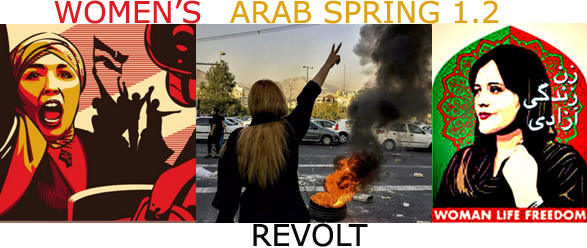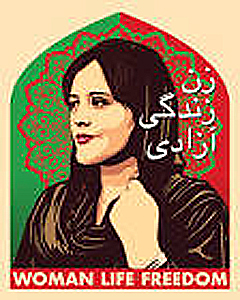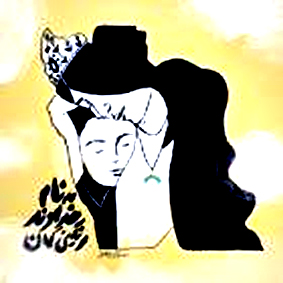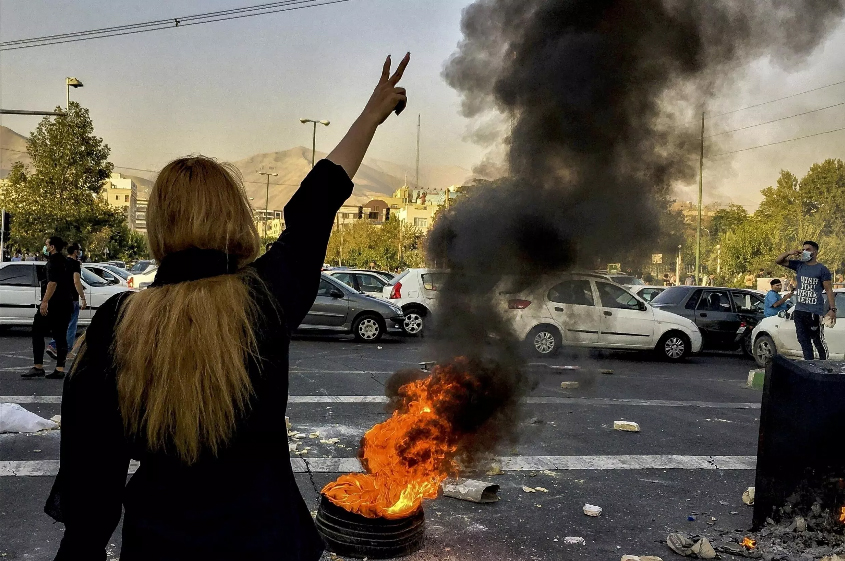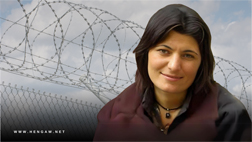|
December 31,
2023 - Preface about the below 3 heroines of Iran by
Gino d'Artali : Beacons of hope and inspiration on the
road towards a long and free Iran . * Jina Amini,
our sister/daughter who martyred herself for freedom;
*Narges Mohammadi, our sister and as I call her 'mother
of a free Iran' and winner of the Nobel Prize of Freedom
2023 and sentenced five times to a total of 31 years in
prison and 154 lashes but who refuses to give in to the
mullahs' regime to wear a hijab or bow to their demands
and therefore is refused medical care although needing
it badly and bringing her live in danger but says "Victory
is not easy, but it is certain" * and Maryam
Akbari Monfared, our sister who's encarcerated since
15 years and refuses to bow down to the mullahs saying "Finally,
one day, I will sing the song of victory from the summit
of the mountain, like the sun. Tomorrow belongs to us"
Read all about them here and let them inspire you on
your road towards a long and free Iran or as we say in
the West: 'Three strikes and the mullahs' regime is out'
Be the finalizing strike dear and brave dissent
|
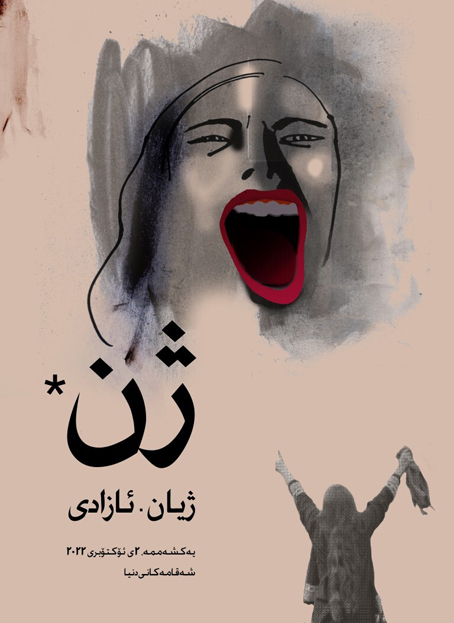
UPDATES OF THE UPRISING
AND REVOLUTION AROUND THE ONE-YEAR ANNIVERSARY OF THE
DEATH OF JINA AMINI IN CUSTODY OF THE REGIME'S
ATTEMPT AND CRUELTY TO TRY AND CRUSH IT.
|
z
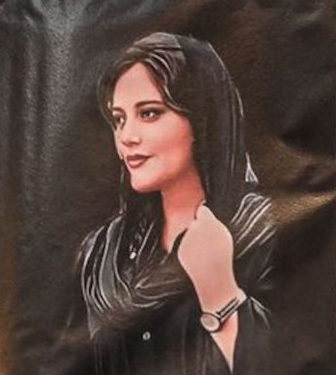
Articles about
<<Mahsa Amini's Father:
<Everything They Have Said and Shown is Lies>
and
WHO JINA AMINI REALLY WAS.
By Diako Alavi, a journalist from Saqqez and family friend of Mahsa
Amini
and
Jina Amini, the face of Irans uprising and revolution:
www.cryfreedom.net/the-face-of-irans-protests.htm
November 15, 2023 -
<<Iranian Woman Arrested on Jinas'
Anniversary Tells Her Story...>
December 12, 2023 -
<<EU Remembers Mahsa Amini at Sakharov Prize Awarding
Ceremony...>
December 23, 2023 -
<<Saleh Nikbakht Interrogated at
Khomeini Airport and the Sakharov Prize confiscated by
Iranian security forces...>
|

We all grief for the loss of our sister / daughter of
Iran Armita Gevarnand:
Read her story here
AND
Updates of Jina Aminis' Revolution:
Part
16:
December 28 - 16, 2023
Part 17:
January 23 - 6, 2024
Part 18:
March 4
- February 8, 2024
and links to earlier parts
Gino d'artali's opinion: We mourn AND fight!
And read also
ONGOING 'TILL VICTORY:
Jan 2024: 'WOMAN, LIFE, FREEDOM'
REVOLUTION
|
|
A to VICTORY tribute to
NARGES MOHAMMADI
Update
March 20, 2024
Letter from Narges Mohammadi for
Newroz
March 8, 2024
"As much as the Woman, Life,
Freedom movement has bolstered women's awareness,
courage, and bravery, it has also resulted in
significant oppression and increased pressure on women
in Iran by the Islamic Republic..."
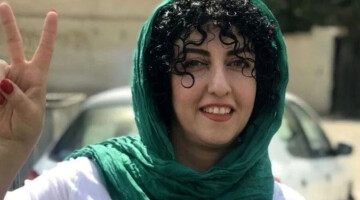
"Victory is not easy, but it is certain"
watch it here :
https://www.youtube.com/watch?v=8LAMPz57Aqw
Updates:
January 23, 2024
"The more of us they lock-up the
stronger we become"...
Click here for a news-overview
from January 15, 2024 'till October 31, 2023
|
JINA AMINI'S VOICE IS ALSO HEARD
And do read the incredible update!
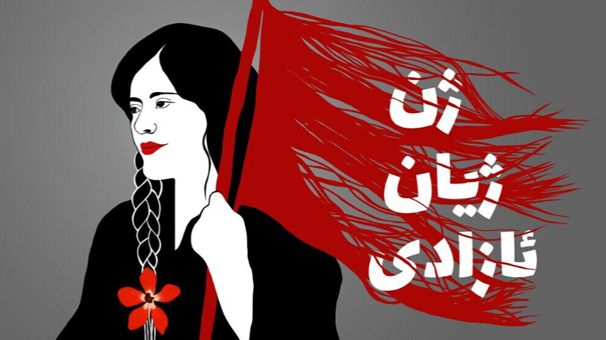
despite the mullahs'
regime to force it down!
And her mother speaks
out loud and clear
|
MARJAM AKBARI
MONFARED
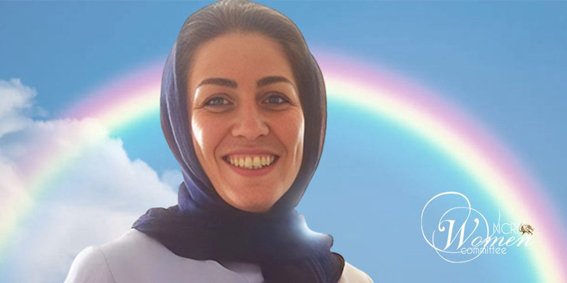
Dec 30, 2023: Not bowing for the mullahs' regime
she says:
"Finally, one
day, I will sing the song of victory from the summit of
the mountain, like the sun. Tomorrow belongs to us"
|
|
Please do read
the following articles about heroines who risk live and
limb for the women-led revolution and no matter what
they'll never give in nor up! and other stories: click on the underlined
topics:
April 8, 2024:
Hengaw Activists Face Threats and
Abductions by Islamic Republic
April 6, 2024:
Iranian heroines whose epic
resistance saved Ashraf
April 5, 2024:
Jaish ul-Adl Intensifies Attacks
Against Iranian Security Forces
April 4, 2024:
International Community Stands
Firm to Renew Fact-Finding Mission in Iran
April 3, 2024:
Exposing Iran's Crimes Against
Humanity
Click here for previous inspiring
stories and articles
incl. Red Alerts |
'The mullahs' regime / OHCHR* gallows' dance'
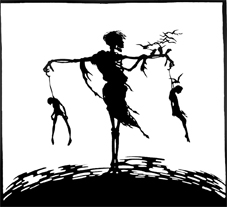
Copyright: Walter Draesner
April 4, 2024
Iran executes 853 people
and March 28, 2024
Iran's March Executions Surge: 18
Killed, Including Ethnic Minorities...and more
March 26 - February 22, 2024
Iranian political prisoners hold
their 9th round of hunger strike in protest to
executions in Iran
and
Saman Yasin, jailed Iranian
rapper: "Take my life too and be done with it"
Click here for earlier reports |
April 4 - 3, 2024
<<Children's and Women's
Rights Activist Samaneh Asghari Transferred to Evin
Prison in Tehran...
and <<Hundreds Extend
Support to 11 Jailed Women's Rights Activists in Iran...
and <<Father of a Teenage
Slain Protester, Detained in Tehran...
and <<Iranian Political
Prisoner Denied Treatment...
and <<Iran Cracks Down on
Teachers, Sack Them for Supporting Protests...
and <<Iranian Sociologist
Held in 'Inhumane' State at Damavand Prison...
and <<Noted Iranian
Activist Begins Hunger Strike in Prison...
and <<Ongoing Crackdown on
the Kurdish Participants in Nawroz Celebrations by
Iranian Authorities....
and <<'Sites of Mass
Killings': Iran Executed Record 853 in 2023, Says
Amnesty...
and <<Iran Prosecutes Over
90 Media Professionals This Year...
and more news |
When one hurts or kills a women
one hurts or kills hummanity and is an antrocitie.
Gino d'Artali
and: My mother (1931-1997) always said to me <Mi
figlio, non esistono notizie <vecchie> perche puoi imparare qualcosa da
qualsiasi notizia.> Translated: <My son, there is no such thing as so
called 'old' news because you can learn something from any news.>
Gianna d'Artali.

The Fact-Finding Mission on Iran: from left, Viviana Krsticevic (Argentina),
Sara Hossain (Bangladesh), and Shaheen Sardar Ali (Pakistan)
NCRI - Womens committee - 3 April 2024 - in Monthlies, in Women's News
<<March 2024 Report: Exposing Iran's Crimes Against Humanity
Exposing Iran's Systematic Human Rights Abuses and Crimes Against Humanity
The month of March saw a milestone session of the UN Human Rights Council in
Geneva with regards to the violations of human rights in Iran, in addition to
several reports by human rights organizations shedding light on the Iranian
regime's crimes against humanity and violations of the rights of Iranian women
and girls. The UN Special Rapporteur on human rights violations in Iran,
Professor Javaid Rehman, reached significant conclusions at the end of his
six-year mandate indicating the need for international investigations into the
massacre of political prisoners in Iran in 1988. In his report to the Human
Rights Council, he urged the international community to call for accountability
with respect to long-standing emblematic events that have been met with
persistent impunity, including the enforced disappearances and summary and
arbitrary executions of 1981 and 1988 and the protests of November 2019. The
Independent International Fact-Finding Mission, appointed in November 2022 by
the UN Human Rights Council to investigate violations of human rights during
Iran protests, also submitted its first report stating, <The violent repression
of peaceful protests and pervasive institutional discrimination against women
and girls has led to serious human rights violations by the Government of Iran,
many amounting to CRIMES AGAINST HUMANITY.> On March 6, Amnesty International
issued a report containing testimonies of dozens of Iranian women and men which
provided <a frightening glimpse into the daily reality of women and girls> in
Iran because of the <Iranian authorities' intensifying persecution of women and
girls, designed to wear down their courageous resistance to the country's
abusive, degrading and discriminatory compulsory veiling laws.> In the meantime,
the London-based Justice for Iran (JFI) human rights NGO, released a report
entitled, <Waging War on Civilians: Exposing Iran's Repressive Units and Crimes
Against Humanity,> in which it listed 20 military units and 542 individuals
responsible for committing crimes against humanity in Iran during the crackdown
on the 2022 nationwide protests and uprising in Iran.
REPORT OF THE SPECIAL RAPPORTEUR ON THE SITUATION OF HUMAN RIGHTS IN IRAN
In his February 9, 2024, report to the UN Human Rights Council, Professor Javaid
Rehman provided an overview of the situation of human rights in Iran. He
expressed deep concern <at the spike in death penalty sentences and executions,>
<executions in relation to the protests,> <execution of child offenders,>
<execution of women,> <arbitrary arrests, detention and violations of the right
to a fair trial,> <increasing limitations placed upon the rights to freedom of
opinion and expression,> <the situation of women and girls,> including <law and
policies of enforced veiling,> and <rape and sexual violence,> <the arrest and
detention of human rights defenders and lawyers,> and <the situation of
minorities.>
March 2024 Report: Exposing Iran's Systematic Human Rights Abuses and Crimes
Against Humanity
Professor Javaid Rehman, UNSR
The situation of women and girls
The <situation of women and girls> was one of the UNSR's key concerns. Following
are excerpts from his report in this regard:
70. Throughout his mandate, the Special Rapporteur has provided recommendations
calling upon the authorities to eliminate in law and in practice all forms of
persecution of and discrimination and violence against women and girls; take all
necessary steps to advance their equal participation in public life; ensure that
the rights of women human rights defenders are protected; and ratify and fully
implement the Convention on the Elimination of All Forms of Discrimination
against Women. He regrets that the Iranian authorities have effectively
maintained a system of gender apartheid and insisted on draconian laws, policies
and practices that increasingly violate the human rights and human dignity of
Iranian girls and women. The Special Rapporteur urges the Iranian authorities to
respect the fundamental human rights and dignity of all Iranian girls and women
and allow them their right to make informed choices about how they express
themselves, in particular about their clothing.
Laws and practices encouraging violence against women and girls
71. The Special Rapporteur seeks an immediate end to the monitoring of women's
dress or behaviour in public or private life through the use of the so-called
morality police or surveillance technology.
72. The Special Rapporteur has clearly stated on numerous occasions the
unacceptability of violence against girls and women. However, he is shocked at
the persistence of laws and practice that continue to support and encourage
violence against women and girls. Misogynistic legislation and discriminatory
practices and behaviour have continued to permeate many aspects of public and
private life. The criminal justice system continues to exonerate perpetrators of
violence against women and girls, or reduce their punishments, as well as
exempting them from criminal liability and qisas, for example for a man
witnessing his wife committing adultery, who kills or assaults either or both
parties.
Age of criminal responsibility
73. The Special Rapporteur remains extremely concerned about the age of criminal
responsibility in the Islamic Republic of Iran. Assigning criminal
responsibility to girls from the age of 9 lunar years for qisas and hudud crimes
has not only resulted in tragic cases, whereby girls who have committed offences
have been sentenced to death and executed, it is also gender discriminatory and
defies international human rights law. When reviewing these cases, it is tragic
to note that the girls who were executed were themselves victims, often of
domestic violence or forced marriages. The Special Rapporteur has previously
raised alarm at the executions of Mahboubeh Mofidi and Zeinab Sekaanvand in 2018
and raises his deep concern about the case of Samira Sabzian, who was executed
in December 2023.
Absence of women in political and administrative leadership
74. The Special Rapporteur regrets the almost complete absence of women in roles
of political and administrative leadership in the country, as established by the
failure to accept the candidacy of a woman for the positions of Supreme Leader
and President. Currently, there are no women in the Assembly of Experts, the
Expediency Council or the influential Guardian Council. Female representation
remains poor in the Iranian parliament - in the parliamentary elections in
February 2020, only 16 of the 290 (5.8 per cent) seats were won by women and 60
per cent of all female candidates were disqualified by the Guardian Council.
There is no female minister in the Cabinet and while three women were appointed
as county governors out of 430 governorships, all were replaced after Ebrahim
Raisi was elected President. As of September 2023, there is reportedly one
female serving as a county governor and one woman as Vice-President for women
and family affairs. Women are ineligible to serve as the head of the judiciary
and cannot be appointed as adjudicating judges.
Age of girls' marriage
75. Related to the age of maturity is the age of marriage, which for girls
currently remains 13, and even younger girls can be married at the behest of the
father and with the approval of the courts. Child marriages are forced marriages
and inherently destructive to the life of the girl child. The Special Rapporteur
is extremely concerned at the increasing number of child marriages in recent
years. He urges the authorities to ... end child marriages and to raise the
minimum age of marriage for both women and men to 18.
76. There is substantial disappointment at the inherent gender discrimination at
all institutional levels, as well as within the law, practices and societal
attitudes.
Institutional impunity and absence of accountability
In the section dealing with the continuing institutional impunity and absence of
accountability, the UNSR expressed regret that <Continuing impunity and the
absence of accountability remains a noticeable but unfortunate feature of the
constitutional, political and legal system of the Islamic Republic of Iran.>
Lack of independent and transparent investigation of Mahsa Jina Amini's death
The Special Rapporteur <is extremely disturbed at the lack of any independent,
impartial and transparent investigation into the death in police custody of Ms.
(Mahsa Jina) Amini, as well as the killings of hundreds of protesters, in
particular women and children, in the context of the ensuing protests....
Despite the gravest of tragedies faced by the Iranian people, it is a matter of
extreme disappointment that the authorities have failed to undertake impartial,
independent and transparent investigations in those cases. None of the security
officials or other officers responsible have been held accountable, sanctioned
or removed from their positions.>
Lack of independent investigation into the poisoning of schoolgirls
83. Similarly, the Special Rapporteur regrets the failure of the authorities to
conduct independent, impartial and transparent investigations into the reported
poisoning of thousands of schoolgirls in 2022 and 2023. While the authorities
claimed to have investigated these events, thus far it is not certain whether
any individuals have been held accountable for the targeted poison attacks on
girls' schools.
Failing to establish an accountability framework in law and in practice
86. In addition to the more recent atrocities, the Special Rapporteur, other
human rights mechanisms, and civil society have documented historic examples of
serious violations of human rights, including the killing of protesters,
torture, arrests, detentions, executions, and enforced disappearances of large
numbers in nationwide protests in 2009, 2019, 2020 and 2021. Other examples
include large-scale enforced disappearances and summary and arbitrary executions
of real or perceived political dissidents, including children, in 1981, 1982 and
1988. The Special Rapporteur regrets to note that none of these events have been
the subject of investigation, inquiry by the Iranian authorities and those
responsible remain unaccountable. The State machinery, on the other hand, has
been deployed for the destruction of any remaining evidence of those crimes, as
well as the harassment and targeting of individuals seeking accountability and
justice, in what appears to be a determined policy of wiping these events from
memory.
State policy of intimidation and persecution of families seeking justice
87. The culture of perpetuating impunity has evolved into a State policy of
intimidation, harassment and persecution of all those seeking accountability,
truth and justice. Institutional and entrenched impunity has resulted in
systematic harassment of human rights defenders, lawyers and other individuals
campaigning for accountability, in a pattern that has emerged over several
decades, whereby victims of human rights violations and their families are
consistently and systematically denied the truth and access to justice.
The absence of an independent judiciary
88. The Special Rapporteur regrets that the absence of an independent judiciary,
its consistent politicization, particularly through the use of the revolutionary
courts, has been a significant factor in the failure of accountability within
the country. The judiciary, including the revolutionary courts, persistently
violate the rule of law, natural justice principles and the international human
rights obligations undertaken by the Islamic Republic of Iran. The Iranian
authorities have consistently refused to conduct investigations into gross
violations of human rights that are compliant with international law,
notwithstanding the consistent calls for such investigations by United Nations
bodies and experts and human rights organizations. Instead of being allowed an
effective participation in investigations, the victims, their families, or their
lawyers are frequently intimidated and ill-treated in an effort to prevent or
discourage them from raising complaints or protesting.
Appeals to abolish the death penalty, repeal mandatory dress code laws, and call
for accountability
Prof. Javaid Rehman, the UNSR on the situation of human rights in Iran called on
the Iranian authorities to immediately abolish, through legislation, the death
penalty for all offenses. Among others, he also made the following
recommendations to the Iranian authorities to:
(n) Repeal all laws and regulations that impose a mandatory dress code and
abolish regulations and procedures whereby women's dress or behaviour in public
or private life are monitored or controlled by State agencies;
(o) Repeal legislation that mitigates or exonerates perpetrators of violence
against women and girls, including for so-called honour killings and criminal
acts within marriage;
(p) Amend the Constitution and repeal existing gender-discriminatory laws and
practices;
(q) End child marriage, including by raising the minimum age of marriage to 18;
(r) Conduct independent, impartial, thorough, effective, credible and
transparent investigations into the deaths of Jina Mahsa Amini, Armita Geravand
and those of all girls and women since September 2022, and ensure that all the
perpetrators responsible are held accountable;
(s) Undertake prompt, independent and impartial investigations into the killing
of protesters and into acts of violence, including torture, enforced
disappearances and arrests that have taken place in the context of the
nationwide protests since 16 September 2022;
(t) Immediately end all forms of violence, arbitrary arrests and detentions of
protesters, identify and apprehend all those suspected of criminal and violent
acts against protesters and ensure that all the perpetrators responsible are
held accountable;
(u) Immediately end all forms of violence, including rape and sexual violence
and harassment of girls and women protesters, conduct immediate, independent and
impartial investigations into the targeting of girls and women, and acts of
violence, including rape and sexual violence, and discrimination against girls
and women, and immediately take concrete steps to apprehend and punish all those
involved in violent crimes against girls and women, including in the poisoning
of girls in schools;
The Special Rapporteur also urged the international community <to call for
accountability with respect to long-standing emblematic events that have been
met with persistent impunity, including the enforced disappearances and summary
and arbitrary executions of 1981 and 1988 and the protests of November 2019.>
March 2024 Report: Exposing Iran's Systematic Human Rights Abuses and Crimes
Against Humanity
The Fact-Finding Mission on Iran: from left, Viviana Krsticevic (Argentina),
Sara Hossain (Bangladesh), and Shaheen Sardar Ali (Pakistan)
THE INDEPENDENT INTERNATIONAL FACT-FINDING MISSION
The Independent International Fact-Finding Mission on Iran said in its first
report on March 8, 2024, concluded that the Iranian regime had committed <crimes
against humanity> through its actions during the clampdown on the protests that
began in September 2022. <The violent repression of peaceful protests and
pervasive institutional discrimination against women and girls has led to
serious human rights violations by the Government of Iran, many amounting to
CRIMES AGAINST HUMANITY.> The FFM report to the Human Rights Council said
violations and crimes under international law committed included <extra-judicial
and unlawful killings and murder, unnecessary and disproportionate use of force,
arbitrary deprivation of liberty, torture, rape, enforced disappearances, and
gender persecution.> The report said the clerical regime deployed <unnecessary
and disproportionate use of lethal force> to put down the protests which
disproportionately impacted women, children, and members of ethnic and religious
minorities. It said Iranian security forces sexually assaulted detainees, adding
that they used shotguns, assault rifles and submachine guns against protesters
<in situations where there was no imminent threat of death or serious injury> to
them, <thereby committing unlawful and extra-judicial killings.> The
Fact-Finding Mission found <a pattern of extensive injuries to protesters' eyes
caused the blinding of scores of women, men and children, branding them for
life.>
Encouraging use of torture to extract confessions
In detention, the State authorities tortured victims to extract confessions or
to intimidate, humiliate or inflict punishment. The Independent International
Fact-Finding Mission said, “Authorities are doubling down on their repression of
families of victims, journalists, human rights defenders, lawyers, medical
doctors, and many others simply for expressing their views, supporting the
protesters, or seeking truth and justice for victims.
<State authorities at the highest levels encouraged, sanctioned and endorsed
human rights violations through statements justifying the acts and conduct of
the security forces.> According to the findings of the Fact-Finding Mission,
<State security forces, in particular the Islamic Revolutionary Guard Corps,
Basij forces and the Law Enforcement Command of the Islamic Republic of Iran (Faraja),
among others, participated in the commission of serious human rights violations
and crimes under international law.> On December 20, 2022, the President of the
Human Rights Council announced the appointment of Sara Hossain (Bangladesh),
Shaheen Sardar Ali (Pakistan), and Viviana Krsticevic (Argentina) to serve as
the three independent members of the Mission and appointed Sara Hossain as its
Chair.
Call to stop executions and to release all detained protesters
The Independent International Fact-Finding Mission made the following
conclusions and recommendations:
122. Pervasive and deep-rooted structural and institutionalized discrimination
against women and girls, permeating all areas of their public and private lives,
was both a trigger and an enabler of the widespread serious human rights
violations and crimes under international law committed against women and girls
in the Islamic Republic of Iran, as well as others advocating for equality and
human rights…
123. Given the gravity of its findings, the mission urges the Iranian
authorities to halt all executions and immediately and unconditionally release
all persons arbitrarily arrested and detained in the context of the protests or
for non-compliance with or advocacy against the mandatory hijab; cease the
judicial harassment of protesters, victims and their families; repeal or amend
laws that discriminate against women and girls, as well as men and boys, in
particular those on the mandatory hijab; and disband the persecutory system of
its enforcement.
124. The mission calls on the Iranian authorities to provide justice, truth and
reparations to victims of human rights violations in connection with the
protests that started on 16 September 2022, survivors and their families, in
accordance with international human rights standards. In the light of the
pervasive impunity and structural discrimination inside the country, Member
States should explore avenues for international and domestic accountability
outside the country, together with providing transformative reparations for
victims, including restitution, compensation, rehabilitation, satisfaction (for
example, commemorations and tributes to victims) and guarantees of
non-repetition....
Need to extend mandate of Fact-Finding Mission
125. Despite its significant findings, with more time available the mission
could strengthen its documentation of the structural and institutionalized
discrimination underlying the protests that it has uncovered and ensure the
effective preservation of evidence for use in legal proceedings.
126. The courage and resilience of women, men, and children of the 'Woman, Life,
Freedom' movement underscores the critical need for global solidarity with those
continuing to fight for equality, justice, the rights to freedom of expression
and of peaceful assembly and the rights of women and girls in the Islamic
Republic of Iran.
AMNESTY INTERNATIONAL: DRACONIAN CAMPAIGN TO ENFORCE COMPULSORY VEILING LAWS
Iran: Draconian campaign to enforce compulsory veiling laws through surveillance
and mass car confiscations, is the title of a report by Amnesty International
published on March 6, 2024. The report concentrates on the Hijab and Chastity
Bill nearing adoption by the Iranian regime’s parliament. The bill aims to
codify and intensify the authorities' assault on women and girls for defying
compulsory veiling. Iranian authorities are waging a large-scale campaign to
enforce repressive compulsory veiling laws through widespread surveillance of
women and girls in public spaces and mass police checks targeting women drivers,
said Amnesty International on the eve of International Women's Day. The new
report by Amnesty International contains testimonies from 46 individuals,
including 41 women, one girl, and four men. The interviews were carried out in
February 2024, coupled with a review of official documents including court
verdicts and prosecution orders. They indicated that a plethora of state
agencies are involved in persecuting women and girls for simply exercising their
rights to bodily autonomy and freedom of expression and belief. Amnesty
International has released excerpts of 20 of the testimonies to provide a
glimpse into the frightening daily reality faced by women and girls in Iran.
Diana Eltahawy, Amnesty International’s Deputy Director for the Middle East and
North Africa said, <In a sinister attempt to wear down resistance to compulsory
veiling in the wake of the 'Woman Life Freedom' uprising, Iran’s authorities are
terrorizing women and girls by subjecting them to constant surveillance and
policing, disrupting their daily lives and causing them immense mental distress.
Their draconian tactics span from stopping women drivers on the road and
carrying out mass confiscation of their vehicles to imposing inhumane flogging
and prison sentences.> According to Amnesty International, official
announcements indicate that since April 2023, Iran's Moral Security Police have
ordered the arbitrary confiscation of hundreds of thousands of vehicles with
female drivers or passengers as young as nine without or in <inappropriate>
headscarves. According to testimonies, such orders are based on pictures
captured by surveillance cameras or reports from plain clothes agents patrolling
the streets and using a police app, called Nazer to report license plates of
vehicles with non-compliant female drivers or passengers. The women targeted and
their relatives have received threatening text messages and phone calls,
instructing them to report to the Moral Security Police to hand over their
vehicles as punishment for defying compulsory veiling. Amnesty International
reviewed screenshots of 60 such text messages issued over the past year to 22
women and men. Women also described to Amnesty International how their access to
public transport, airports and banking services is regularly denied and
conditioned upon them wearing a headscarf. Women detailed how state enforcers,
especially at airports, denied access to women and girls in hats and scrutinized
the length and fit of their sleeves, trousers, and uniforms. Women further
described such encounters are routinely accompanied by verbal abuse, including
gender-based insults and threats of prosecution. One woman also told the
organization about an incident in late 2023 where an enforcer at a metro station
in Tehran punched her 21-year-old cousin in the chest. A 17-year-old girl told
Amnesty International that her school principal temporarily suspended her after
a CCTV camera captured her unveiled in a classroom, and threatened to report her
to the Intelligence Organization of the Revolutionary Guards if she removed her
headscarf again. In January 2024, the authorities implemented a flogging
sentence of 74 lashes against Roya Heshmati for appearing unveiled in public. In
a testimony on her social media account, she recounted her flogging by a male
official in the presence of a judge in a room she described as a <medieval
torture chamber.>
JUSTICE FOR IRAN: EXPOSING IRAN'S REPRESSIVE UNITS AND CRIMES AGAINST HUMANITY
The London-based Justice for Iran put out its report on March 6, 2024. The
report entitled, <Waging War on Civilians. Exposing Iran's Repressive Units and
Crimes Against Humanity,> JFI highlights serious human rights violations during
the crackdown on the 2022-23 protests in Iran.
March 2024 Report Exposing Iran's Crimes Against Humanity
Security forces, treating the protests as armed conflict, deployed military
units, and utilized lethal weapons to suppress demonstrations. The crackdown
involved indiscriminate shootings, targeting civilians, bystanders, and
buildings. Additionally, security forces used brutal force against detainees and
employed child soldiers. These actions, along with the government's portrayal of
protests as a 'war against the State,' may constitute crimes against humanity,
JFI said.
The report is based on the review of 35,000 pieces of audiovisual evidence
collected by Justice for Iran.
The JFI has identified at least twenty suppression units within the
Revolutionary Guard Corps, Basij, and the police force. The responsibility of
some of these military units in suppressing the protests, including the combat
battalions of Imam Hossein in the IRGC provincial Corps, and Special Forces
combat units like the 3rd Division of Hamzeh Seyed Al-Shohada, 15th Brigade of
Imam Hassan Special Forces, and Mahdi Special Forces Unit, is for the first time
investigated within the framework of international law. The report also
identifies 526 individuals who played a role in crimes against the protesters.
The findings of this 250-page report indicate that the authorities of the
Islamic Republic at the highest levels responded to protests under the label of
<hybrid war> and treated them as an armed conflict. They categorized protesters
as combatants or Muharb and deployed military combat units specialized in
confronting and killing armed combatants, along with security forces equipped
with deadly light and heavy military grade weapons for suppressing the
protesters. These forces were authorised to kill, torture, and terrorise
protesters and even passersby, who are unequivocally classified as civilians
according to the principles of international law. The findings of the report
indicate that security forces, as part of a pre-designed and practiced plan,
deliberately targeted protesters, passersby, passing vehicles, public
transportation, residential buildings, commercial buildings, and medical centers
to instill fear and terror among citizens. These actions were carried out
extensively in at least 15 cities in 10 provinces. The videos collected by
Justice for Iran show at least 40 instances of indiscriminate shooting at
protesters, passersby, and passing vehicles, and 63 instances of shooting at
residential buildings, shops, and hospitals.
TIME TO END IMPUNITY AND HOLD PERPETRATORS ACCOUNTABLE
For the first time, a UN body has confirmed that some of the crimes committed
during the 2022-23 protests in Iran amounted to crimes against humanity. In the
meantime, the UN Special Rapporteur has underlined the need to hold the Iranian
regime accountable for the arbitrary executions and forced disappearances which
took place in 1981, 1982, 1988 and during the protests in November 2019. Other
reports and findings by human rights NGOs and organizations also authenticate
the extensive violations of human rights and women's rights in Iran. The time
has come to refer the dossier of the Iranian regime's human rights violations to
the UN Security Council and prosecute the perpetrators of these crimes in
international courts.>>
Source:
https://women.ncr-iran.org/2024/04/03/march-2024-crimes-against-humanity/
Women's
Liberation Front 2019/cryfreedom.net 2024
|
